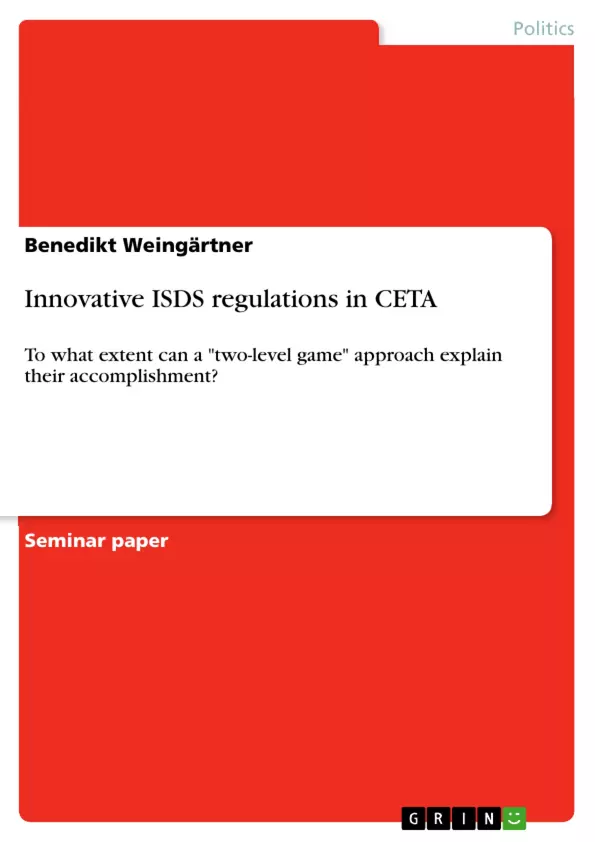This essay uses Putnam’s two-level game approach to analyse why CETA was firstly endangered but did eventually not fail because of the dispute on ISDS. I argue that this can be mainly explained by the overlapping of the win-sets, decisively rendered possible by the change of government in Canada.
In this essay, I will first of all evaluate the win-sets of both parties. Secondly, I will analyse how and why these win-sets did at first not overlap but eventually did, before concluding with an estimation of the usefulness of Putnam’s two-level game theory for European trade policy.
Inhaltsverzeichnis (Table of Contents)
- Introduction - CETA, ISDS and two-level games
- The European Union's win-set
- Canada's win-set
- From hardened fronts to a “clear break from the current ISDS system”
- Putnam's two-level game – a useful tool to analyse European trade policy?
Zielsetzung und Themenschwerpunkte (Objectives and Key Themes)
This essay investigates the reasons behind the successful negotiation of the Comprehensive Economic and Trade Agreement (CETA) between the European Union and Canada, focusing specifically on the controversial issue of Investor-State Dispute Settlement (ISDS). The essay utilizes Robert Putnam’s “two-level game” approach to analyze the win-sets of both parties, highlighting how their overlapping made the agreement possible.
- The significance of ISDS in CETA and its potential impacts on state sovereignty
- The role of domestic politics and public opinion in shaping the negotiation process
- The interplay between national and international levels in trade negotiations
- The impact of political institutions on the size and shape of win-sets
- The effectiveness of Putnam's two-level game theory in analyzing European trade policy
Zusammenfassung der Kapitel (Chapter Summaries)
- Introduction - CETA, ISDS and two-level games: This section introduces the CETA agreement, the ISDS controversy, and the two-level game approach used in the analysis. The essay outlines the main arguments and structure.
- The European Union's win-set: This chapter explores the factors influencing the European Union's win-set, including economic and geopolitical objectives, domestic preferences and coalitions, and the complexities of the EU's ratification process. The essay analyzes how these factors influenced the EU's position on ISDS in CETA.
- Canada's win-set: This section examines the factors shaping Canada's win-set, including economic and geopolitical objectives, domestic resistance, and the relative strength of federal institutions compared to EU member states. The essay analyzes the impact of these factors on Canada's position on ISDS.
- From hardened fronts to a “clear break from the current ISDS system”: This chapter analyzes the initial deadlock in the negotiations due to conflicting positions on ISDS. It examines how the change in government in Canada in 2015, leading to a more flexible stance on ISDS, enabled the win-sets to overlap and ultimately led to a successful agreement.
Schlüsselwörter (Keywords)
The primary keywords and focus topics of this essay include: CETA, ISDS, two-level games, win-sets, trade policy, EU, Canada, domestic politics, international negotiations, sovereignty, investment protection, public opinion, political institutions, ratification process.
- Quote paper
- Benedikt Weingärtner (Author), 2016, Innovative ISDS regulations in CETA, Munich, GRIN Verlag, https://www.grin.com/document/373602




